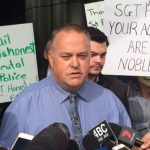Crime and Corruption Commission Turns it’s Back on Honest Cop

The body meant to oversee the conduct of police in Queensland – the Crime and Corruption Commission (CCC) – has told former police officer Rick Flori that it won’t be investigating a campaign of reprisals against him by other officers of the force.
Mr Flori was accused of leaking footage to the media of police officers beating chef, Noa Begic, in the back of a police vehicle in the Surfers Paradise Police Station carpark in 2012.
He was stood down from the force and fought the Queensland Police Service (QPS) in court, after it laid misconduct charges against him.
After a long and protracted legal battle, the case eventually went to court and a jury found Mr Flori not guilty earlier this year.
Original complaint
The former officer originally lodged a complaint with the CCC in 2016 over the treatment he received at the hands of the QPS– including his suspension as well as harassment and intimation by colleagues.
The complaint questions why officers involved in the assault have never been charged, despite damning video evidence of them bashing Mr Begic and then washing the blood away.
At the time, the CCC told Mr Flori that it would not investigate the matter while misconduct charges against him were before the court.
Now that it’s more than six months since Mr Flori was found not guilty, supporters of the vindicated former officer bombarded the CCC Facebook page, demanding the body investigate the matter.
CCC refuses to investigate
Despite those demands, the CCC’s assistant director or integrity services, Darren Brookes, advised Mr Flori in an official letter that he is: “not minded to … reopen this matter”.
In the letter, Mr Brookes makes the bizarre statement that the CCC would only investigate if a judge makes an adverse finding against police, or if there is further evidence against police.
This is despite the fact it was Mr Flori on trial – not the police – and there would be no reason for a judge to expressly make an adverse finding against police during the criminal prosecution of Mr Flori, and the fact the CCC is meant to be an investigative body.
As Mr Flori explained to media: “They’re basically saying they won’t even investigate until there’s a court ruling that wrongdoing occurred, or they’re asking me to investigate this and bring them evidence myself. Only I’m not getting paid $130,000 a year to do it, like the investigators at the CCC. They’ve never once contacted me or sought to interview me.”
The CCC’s handling of misconduct claims has come under scrutiny in recent years, with many critical of the oversight body’s lack of ‘teeth’ and inability to protect ‘whistleblowers’.
Many have also questioned the independence of the body, pointing out that a number of its members are former police officers. But the CCC has hit back, stating:
“It is important to note that the CCC’s jurisdiction requires a reasonable suspicion of corrupt conduct before an investigation can be commenced. It is the assessment of complaints and fulsome information which assists in determining if there is a reasonable suspicion.”
Better accountability mechanisms
Despite recommendations for better accountability and more transparency, police in Queensland have largely been left to police themselves, as oversight bodies lack the funding and manpower to investigate complaints and have no power to discipline or bring criminal charges against officers who are found to have engaged in crime and corruption.
Michael Cope, the president of the Queensland Council of Civil Liberties, believes part of the problem stems from the decision in 2001 to merge the state’s criminal justice commission with the state’s crime commission.
He says the Crime and Misconduct Commission, which later became the CCC, effectively functions as a “super police force” that handles major criminal cases alongside the oversight of police and the public sector.
He explains that in order to function more effectively, those roles should be separated.
Social Justice advocate, and victim of police misconduct, Renee Eaves announced last month that she plans to launch a new independent group, to “highlight the inadequate oversight of police misconduct and police corruption as well as nepotism and maladministration.”
It is hoped the exposure of the inadequacies in existing mechanisms will ultimately lead to reform.








